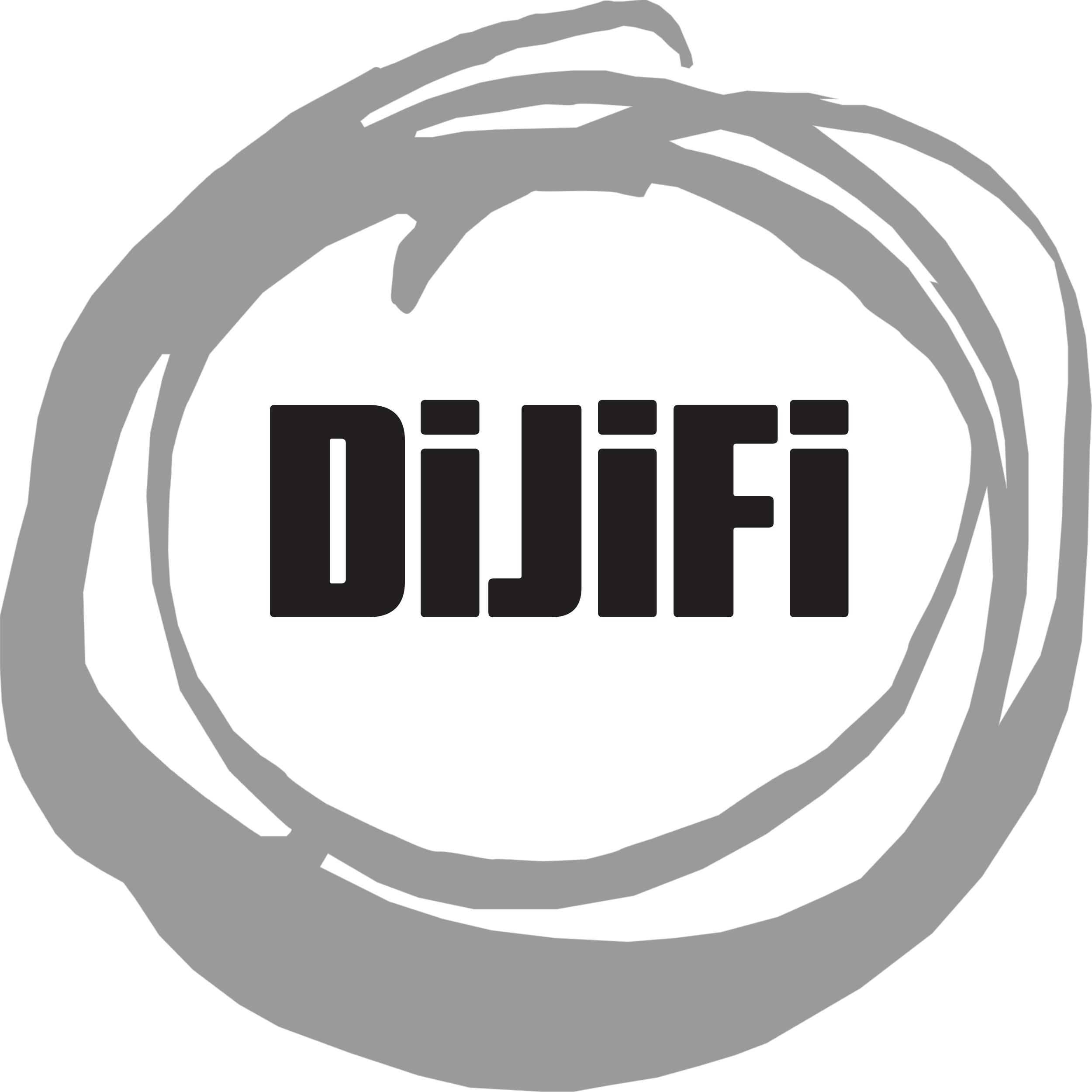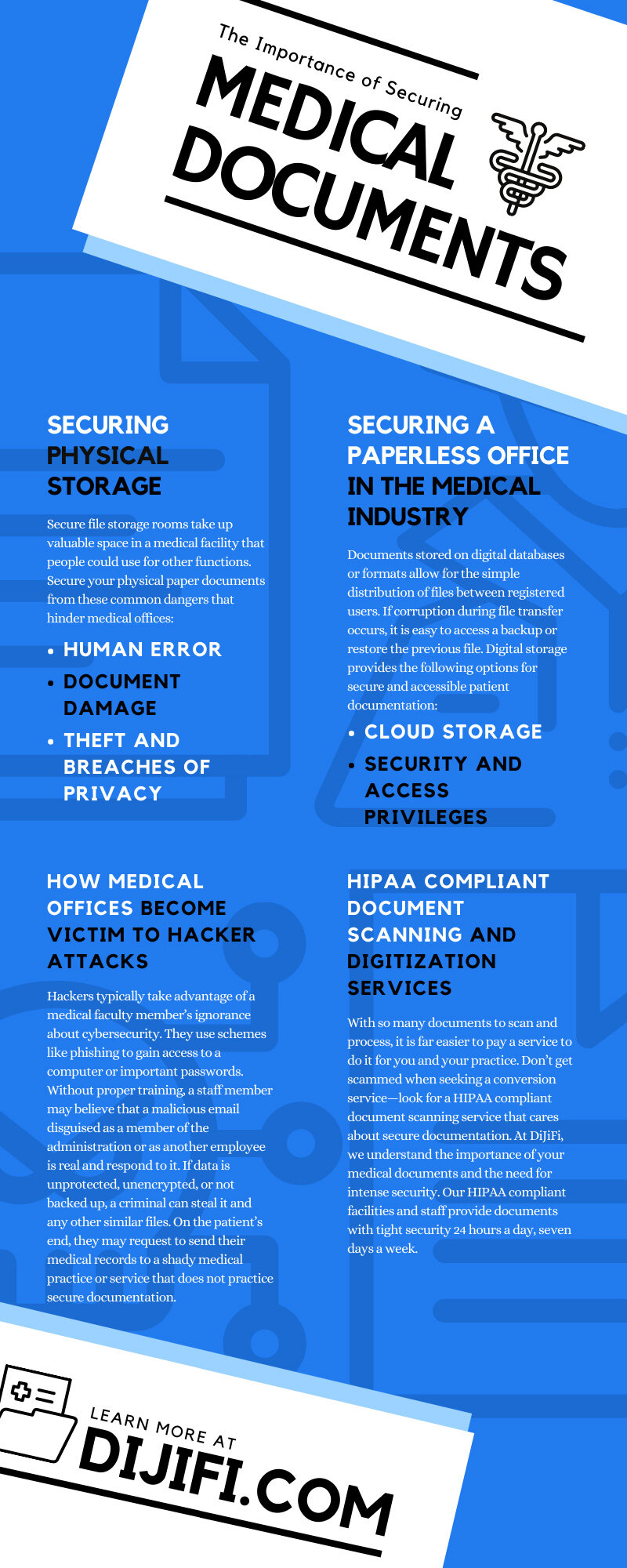The Importance of Securing Medical Documents
Some of the most common sights in a medical office include the piles, folders, and drawers full of important private documents. These documents are essential to the employees who work with patients, but in a physical paper form, they are at risk of damage, loss, or even theft. Without proper document security, a medical practice can violate a patient’s privacy and lose crucial information. To prevent the unfortunate loss of patient information, read ahead to learn the importance of securing medical documents, and how to properly store sensitive patient information.
Securing Physical Storage
Keeping documents in large filing cabinets was necessary in the medical industry at one point, but the advancement of computer storage and cybersecurity calls for new methods of document storage. Secure file storage rooms take up valuable space in a medical facility that people could use for other functions. Secure your physical paper documents from these common dangers that hinder medical offices:
Human Error
Even professionals misplace important things. Disorganized workspaces and negligence can result in lost documents. Without proper document security and rules on who can access the data, these accidents can become commonplace. Adding a check-out and check-in sheet to a storage room may help, so long as everyone uses it. People could still forget to use it—or purposefully avoid it.
Document Damage
Accidents can happen anywhere, even in hospitals or medical facilities. The more people allowed access to a document, the more likely it is to experience critical damage like stains and tears. Furthermore, physical documents are subject to damage in the event of a disaster. While many storage solutions offer sturdy protection from the elements and natural phenomena, they are not always foolproof. Extreme disasters may result in the loss of documentation.
Theft and Breaches of Privacy
Tracking a criminal responsible for a security breach affecting paper documents might prove to be more difficult than with digital documents, as you cannot track the documents themselves. If you do not see the crime happen immediately or notice a patient’s missing information, you could have an unsolvable crime on your hands. Even employees are capable of stealing patient information and using it for their own motivations, such as selling the information for profit or using it to purchase prescriptions.
Securing a Paperless Office in the Medical Industry
Digital documents are easier to secure if your office makes the effort to keep them out of the hands of hackers. Often, security breaches of digitally stored patient information are due to negligence. Digital security in the medical industry has not been a requirement until recently, as digital attacks started to ramp up. When they are properly secured and encrypted, your documents will stay safe from cyber predators searching for quick cash or blackmail material.
Documents stored on digital databases or formats allow for the simple distribution of files between registered users. If corruption during file transfer occurs, it is easy to access a backup or restore the previous file. Digital storage provides the following options for secure and accessible patient documentation:
Cloud Storage
Digitizing your paper files means you can utilize cloud-based storage for your medical practice. Cloud-based storage is an online storage system that allows team members with the proper security privileges to access documentation whenever they need it. Doctors and administrative staff can access the cloud from anywhere, meaning that teams from different offices and locations can share the documentation easily. The cloud also makes it easy for remote employees to access data that they need while working from home or a different office.
Security and Access Privileges
Once a team digitizes a file, it is important that the administration encrypts and restricts access to it when stored. Unencrypted files are easy targets for malicious attackers. An expert technology security team in charge of protecting data can spot problems before they happen and address them accordingly. The responsibility also falls on the doctors and staff to learn the importance of securing medical documents, because a doctor or staff member who practices unsafe web or computer activity puts thousands of patients at risk.
How Medical Offices Become Victim To Hacker Attacks
Hackers typically take advantage of a medical faculty member’s ignorance about cybersecurity. They use schemes like phishing to gain access to a computer or important passwords. Without proper training, a staff member may believe that a malicious email disguised as a member of the administration or as another employee is real and respond to it. This opening is large enough for the hacker to steal precious data or install malware (like ransomware or viruses) on the employee’s system.
If data is unprotected, unencrypted, or not backed up, a criminal can steal it and any other similar files. Documents that list passwords, which employees often keep on their desktops or in their files, are an extreme security risk, especially if the hacker gains access to remote desktop software.
On the patient’s end, they may request to send their medical records to a shady medical practice or service that does not practice secure documentation. Before sending information anywhere, have the patient understand that medical documentation is one of the most personal forms of data and that they should handle it very carefully.
HIPAA Compliant Document Scanning and Digitization Services
Backing your data up to the cloud or to some form of digital storage may require using digital conversion services. With so many documents to scan and process, it is far easier to pay a service to do it for you and your practice. Don’t get scammed when seeking a conversion service—look for a HIPAA compliant document scanning service that cares about secure documentation.
At DiJiFi, we understand the importance of your medical documents and the need for intense security. Our HIPAA compliant facilities and staff provide documents with tight security 24 hours a day, seven days a week. By digitizing your documents and destroying the original copies, not only will you save yourself space in the office, but you will also ensure the safety of your patients and staff.


